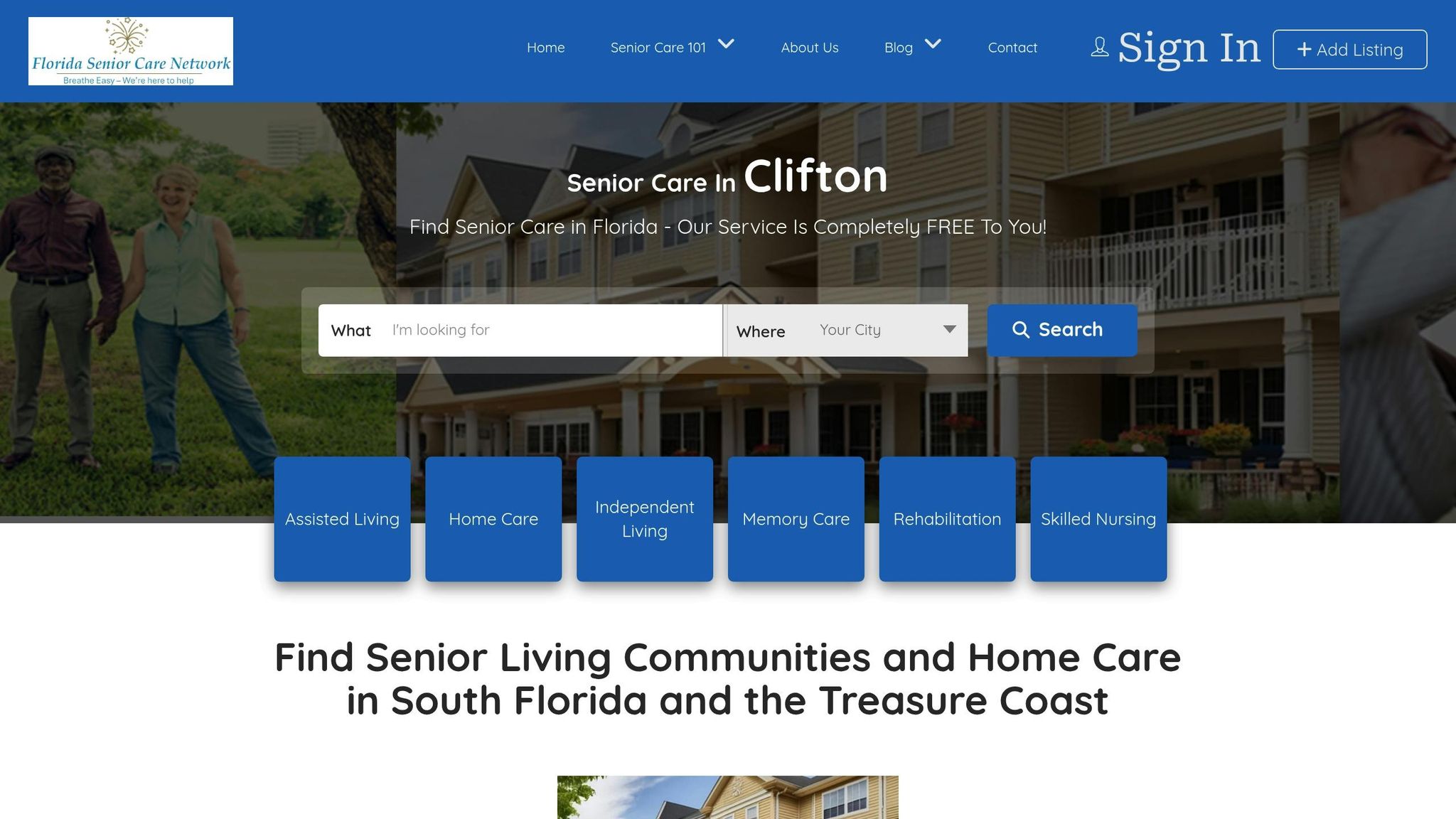Memory care and assisted living are two different types of senior care. Here’s what you need to know:
- Memory Care: Designed for individuals with Alzheimer’s, dementia, or other memory-related conditions. It offers 24/7 supervision, structured routines, specialized staff training, and enhanced safety features like secured spaces and navigation aids.
- Assisted Living: Focuses on helping seniors with daily tasks while promoting independence. Services include personal care assistance, medication management, and social activities in a home-like environment.
Quick Comparison:
| Feature | Memory Care | Assisted Living |
|---|---|---|
| Care Level | Specialized for memory loss | General daily assistance |
| Supervision | 24/7 monitoring | Basic oversight |
| Activities | Cognitive-focused programs | Social and wellness events |
| Safety | Secured spaces, anti-wandering | Basic security |
| Cost (Florida) | Avg. $9,017/month | Avg. $8,233/month |
Key Takeaway: Choose memory care for advanced cognitive needs and safety concerns. Opt for assisted living if your loved one needs help with daily tasks but can maintain some independence.
Understanding Assisted Living vs. Memory Care
Memory Care Basics
Memory care facilities are designed to support seniors dealing with Alzheimer’s, dementia, and other cognitive challenges. These communities focus on creating a safe, structured environment that helps reduce confusion and improve the quality of life for residents experiencing memory loss.
Core Memory Care Services
Memory care communities provide a range of specialized services. One key aspect is 24/7 supervision, with a staff-to-resident ratio typically around 1:5 or 1:6. This ensures residents receive close monitoring and prompt assistance whenever necessary.
Some of the main services include:
- Cognitive Therapy Programs: Activities like music therapy, art therapy, and reminiscence therapy help residents maintain mental and emotional well-being.
- Structured Daily Routines: A predictable schedule offers a sense of stability and comfort.
- Dining Support: Meals are tailored to address appetite challenges, using strategies like color-contrasted plates and flexible meal times.
“Memory care is a specialized form of long-term care specifically designed to support individuals with memory-related conditions, such as Alzheimer’s disease, vascular dementia, Lewy body dementia, and other cognitive impairments. This type of care addresses the unique challenges associated with memory loss, providing residents with a structured, secure, and supportive environment where they can thrive.” – ONELIFE Senior Living
Staff Training and Facility Design
Memory care facilities are intentionally designed to meet the needs of residents with memory issues. Their layouts include:
- Enhanced Security: Features like keypad-controlled entrances and alarmed doors help prevent wandering.
- Navigation Aids: Marked pathways and color-coded walls make it easier for residents to find their way.
- Calming Spaces: Soothing decor and quiet environments help reduce anxiety and confusion.
Staff members receive specialized training to address the challenges that come with memory loss. They are equipped to manage behaviors like agitation, wandering, and communication difficulties.
With around 5.8 million Americans living with Alzheimer’s or dementia, memory care facilities play an essential role in supporting both residents and their families. This focused approach sets memory care apart from other senior living options.
Assisted Living Overview
Assisted living facilities provide support with daily tasks while allowing residents to maintain their independence. They combine housing, personal care, and medical services in a comfortable, home-like environment.
Daily Support Services
These facilities offer customized care to meet individual needs. For instance, 96% of assisted living facilities monitor residents’ health through regular checks like blood pressure and weight measurements. Key services include:
- Medication Management: Staff handle medication administration and tracking.
- Personal Care Assistance: Help with tasks like bathing, dressing, and grooming.
- Dining Services: Nearly all facilities (98%) provide three balanced meals daily, and 93% accommodate special dietary needs.
- Healthcare Coordination: Staff help schedule medical appointments and arrange transportation.
- Housekeeping: Routine cleaning and maintenance services are provided.
In addition to these essentials, facilities promote social engagement through a variety of activities designed to enhance residents’ quality of life.
Community Activities
Assisted living communities go beyond basic care by offering programs that encourage social interaction and personal growth. Activities are designed to support mental, physical, and social well-being.
| Activity Type | Examples | Benefits |
|---|---|---|
| Creative Arts | Art classes, music sessions, crafting | Encourages self-expression and mental stimulation |
| Physical Wellness | Fitness classes, walking clubs, yoga | Helps maintain strength and mobility |
| Social Events | Game nights, movie screenings, barbecues | Builds social connections |
| Cultural Outings | Museum visits, theater trips, local attractions | Offers enriching experiences |
Residents’ preferences play a key role in shaping activity schedules, ensuring programs align with their interests and abilities. Transportation is available for both outings and medical appointments. Additionally, about 82% of facilities allow residents to hire private nurses or aides for more personalized care.
sbb-itb-c43b331
Memory Care vs. Assisted Living: Main Differences
Understanding the distinctions between memory care and assisted living helps families make informed care decisions.
Care Level Requirements
Memory care provides constant, specialized supervision, while assisted living focuses on helping with daily tasks while encouraging independence.
| Care Aspect | Assisted Living | Memory Care |
|---|---|---|
| Supervision Level | Basic oversight with some independence | 24/7 monitoring |
| Daily Structure | Flexible scheduling | Structured routines to minimize confusion |
| Activity Focus | General wellness and social activities | Cognitive exercises and memory-focused tasks |
| Daily Support | Assistance with daily tasks | Enhanced support tailored to dementia needs |
Next, let’s look at the safety protocols that set these care options apart.
Security Features
Memory care facilities are designed with advanced safety measures to protect residents with cognitive challenges. These include:
- Secure outdoor areas, such as fenced courtyards
- Advanced monitoring systems to prevent wandering
In contrast, assisted living offers basic security features while allowing residents more independence.
These safety measures are paired with specialized training for memory care staff to ensure a secure environment.
Staff Requirements
The training and staffing expectations vary significantly between these two care types, especially in states like Florida. Memory care staff undergo mandatory dementia-specific training and regular ongoing education.
Memory care facilities also maintain higher staff-to-resident ratios, ensuring residents receive focused attention. Assisted living staff, while trained in general caregiving, typically lack the specialized training needed for advanced cognitive care.
Cost Breakdown
Understanding care costs is crucial for effective planning.
Florida Memory Care Pricing
In 2024, the average monthly cost of memory care in Florida was $9,017. However, costs vary widely depending on the city:
| City | Monthly Cost |
|---|---|
| Jacksonville | $6,894 |
| Miami | $6,483 |
| Tampa | $4,956 |
| Orlando | $5,962 |
| Cape Coral | $6,409 |
| Tallahassee | $6,894 |
Tampa stands out as one of the more affordable options, while areas like The Villages tend to be more expensive. Factors like amenities and occupancy can cause price differences of up to 20%.
Florida Assisted Living Pricing
Assisted living is generally less expensive, with a statewide average of $8,233 per month. Here’s a breakdown of average costs in major cities:
| City | Monthly Cost |
|---|---|
| Jacksonville | $6,294 |
| Miami | $5,919 |
| Tampa | $4,525 |
| Orlando | $5,443 |
| Port St. Lucie | $5,103 |
| Tallahassee | $6,294 |
The higher cost of memory care compared to assisted living reflects the additional services, such as specialized care and increased security. Between 2022 and 2023, memory care costs in Florida rose by 6%, increasing from $4,380 to $4,642. For families, there are various ways to manage these expenses.
Payment Options and Financial Help
Florida offers several programs to help residents cover care costs:
- Medicaid Programs: The Statewide Medicaid Managed Care Long-Term Care (SMMC-LTC) program can contribute up to $1,500 per month toward care costs, though it doesn’t cover room and board.
- Non-Medicaid Options: Programs like the Optional State Supplement (OSS), Alzheimer’s Disease Initiative (ADI), Community Care for the Elderly (CCE), Home Care for the Elderly (HCE), and Project R.E.L.I.E.F. provide additional support.
For guidance on eligibility and maximizing benefits, Medicaid planners can be a valuable resource. Other potential funding sources include veterans’ benefits and eldercare loans, which may help eligible individuals manage care costs.
Selecting the Best Care Option
After understanding the differences between memory care and assisted living, the next step is to assess your loved one’s specific needs to make the right choice.
When to Choose Memory Care
Certain safety and health concerns can signal the need for memory care. Here are some key indicators:
| Warning Sign | What to Look For |
|---|---|
| Safety Risks | Wandering, getting lost, or unsafe use of appliances |
| Daily Living | Struggles with tasks like bathing or confusion with medications |
| Behavioral Changes | Increased agitation, especially in the afternoon (sundowning) |
| Medical Needs | Advanced memory-related conditions requiring specialized care |
Once these signs are evident, it’s time to evaluate facilities that meet those needs.
Facility Tour Checklist
When visiting potential care facilities, focus on these key areas:
- Safety Features: Look for 24/7 monitoring, secured entrances/exits, emergency protocols, non-slip floors, proper lighting, and clearly marked areas.
- Staff Qualifications: Ensure caregivers have dementia-specific training, check staff-to-resident ratios, look for consistent caregiver assignments, and ask about ongoing training programs.
- Environment and Activities: Assess if spaces are calm and well-organized with memory-supportive cues, review activity schedules, inspect outdoor areas for safety, and evaluate meal services and dining assistance.
After visiting, use your observations to narrow down your options.
Finding Care Through Florida Senior Care Network

Once you’ve identified what your loved one needs, finding a reliable provider is the next step. Florida Senior Care Network connects you with licensed care communities across South Florida and the Treasure Coast. Their platform provides detailed listings of memory care and assisted living facilities, including information on specialized programs and services.
“It helps to understand the kind of dementia your loved one has and how quickly it is expected to progress”, advises Maureen Bradley.
Next Steps
To move forward with finding the right care, here’s what you can do:
- Schedule an in-person evaluation through Florida Senior Care Network. During this assessment, specialists will review:
- Your current level of independence
- Medical needs
- Budget considerations
- Preferred location
- Social and activity interests
- Explore licensed communities in South Florida and the Treasure Coast using Florida Senior Care Network’s directory. This tool allows you to:
- Directly compare facilities
- Access detailed information about programs
- Check out amenities and activities
- Contact communities directly without third-party involvement
- Make your final decision by completing these key actions:
| Action Item | Purpose | Benefit |
|---|---|---|
| Request Current Pricing | Compare costs with your budget | Avoid unexpected financial surprises |
| Schedule Multiple Tours | Visit communities in person | Get a clear sense of the environment |
| Review License Status | Confirm facility credentials | Ensure compliance with state regulations |
These steps simplify the process and help you make an informed choice. Florida Senior Care Network offers these services at no cost to families, focusing exclusively on licensed providers. This ensures confidence in the quality of care your loved one will receive.
Take advantage of the direct contact feature to gather the information you need and choose the best care option efficiently.


